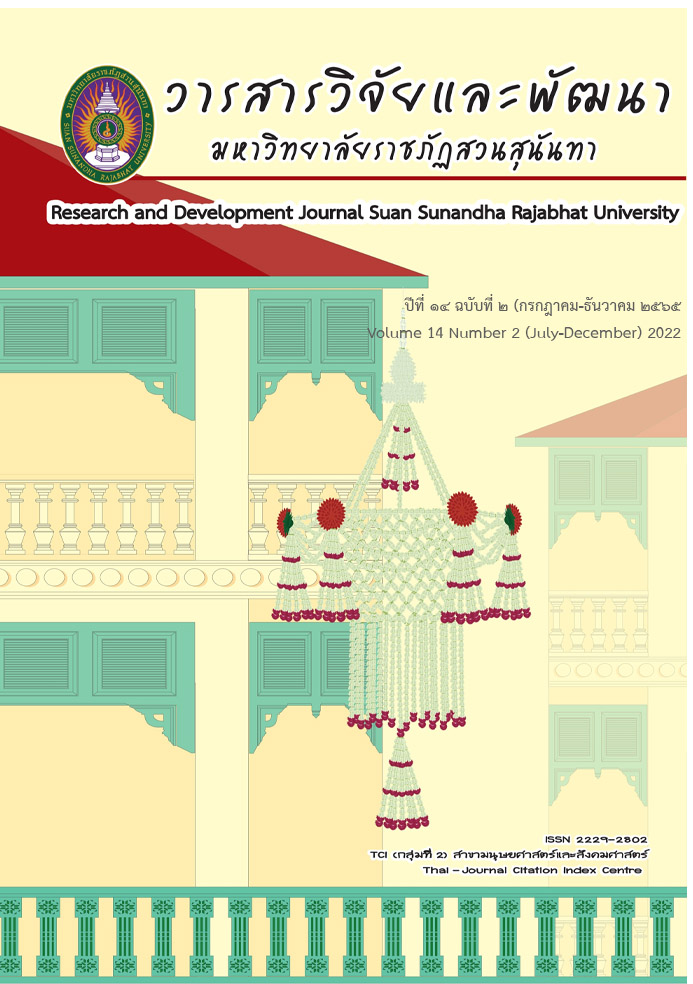ผลการใช้หนังสือความจริงเสริมด้วยกระบวนการพัฒนาการอ่านร่วมกับการเรียนรู้แบบทวิภาษาเพื่อพัฒนาทักษะการอ่าน เรื่อง คำศัพท์พื้นฐานภาษาไทย สำหรับนักเรียนชั้นประถมศึกษาปีที่ 1
คำสำคัญ:
หนังสือความจริงเสริม, ทักษะการอ่าน, การเรียนรู้แบบทวิภาษา, คำศัพท์พื้นฐานชั้นประถมศึกษาปีที่ 1, ผลสัมฤทธิ์ทางการเรียน, ความพึงพอใจบทคัดย่อ
งานวิจัยครั้งนี้มีวัตถุประสงค์เพื่อ (1) พัฒนาหนังสือความจริงเสริมด้วยกระบวนการพัฒนาการอ่านร่วมกับการเรียนรู้แบบทวิภาษาเพื่อพัฒนาทักษะการอ่าน เรื่อง คำศัพท์พื้นฐานภาษาไทยสำหรับนักเรียนชั้นประถมศึกษาปีที่ 1 (2) ศึกษาผลการใช้หนังสือความจริงเสริม (3) ศึกษาความพึงพอใจของนักเรียนที่มีต่อการใช้หนังสือความจริงเสริม กลุ่มตัวอย่าง คือ นักเรียนชั้นประถมศึกษาปีที่ 1 โรงเรียนบ้านบางมะรวด จำนวน 60 คน แบ่งเป็นกลุ่มทดลอง 30 คน และกลุ่มควบคุม 30 คน เครื่องมือที่ใช้ในการวิจัยคือ (1) แบบประเมินคุณภาพของหนังสือความจริงเสริม (2) หนังสือความจริงเสริมด้วยกระบวนการพัฒนาการอ่านร่วมกับการเรียนรู้แบบทวิภาษาเพื่อพัฒนาทักษะการอ่าน เรื่อง คำศัพท์พื้นฐานภาษาไทยสำหรับนักเรียนชั้นประถมศึกษาปีที่ 1 (3) แผนการจัดการเรียนรู้โดยใช้หนังสือความจริงเสริม (4) แผนการจัดการเรียนรู้แบบปกติ (5) แบบวัดทักษะการอ่านคำศัพท์พื้นฐานภาษาไทยสำหรับนักเรียนชั้นประถมศึกษาปีที่ 1 (6) แบบประเมินความพึงพอใจต่อการใช้หนังสือความจริงเสริมของนักเรียน สถิติที่ใช้ในการวิเคราะห์ข้อมูล ได้แก่ ค่าเฉลี่ย ส่วนเบี่ยงเบนมาตรฐาน และ ค่า t-test
ผลการวิจัยพบว่า (1) หนังสือความจริงเสริม มีคุณภาพอยู่ในระดับดีมาก (M = 4.64, S.D. = 0.40) และมีประสิทธิภาพ (E1/E2) เท่ากับ 81.27/80.63 (2) ผลการศึกษาทักษะการอ่านคำศัพท์พื้นฐานภาษาไทยของนักเรียนชั้นประถมศึกษาปีที่ 1 พบว่า กลุ่มทดลอง (M = 32.10, S.D. = 4.31) มีคะแนนสูงกว่ากลุ่มควบคุม (M = 23.50, S.D. = 10.30) อย่างมีนัยสำคัญทางสถิติที่ระดับ .01 (3) ผลการศึกษาความพึงพอใจของนักเรียนที่มีต่อการใช้หนังสือความจริงเสริม พบว่า มีความพึงพอใจอยู่ในระดับมากที่สุด โดย (M = 3.75, S.D. = 0.53)
เอกสารอ้างอิง
Akkeedej, A. (2020). The Development of Augmented Reality Media in Musical Instrument for Grade 4 Students of Srinakharinwirot Ongkharak Demonstration School. Bangkok: Srinakharinwirot University. (In Thai)
Chirawut, A. (2014). pointed Out The Problem of Inability to Read and Write This is The Reason Why O-NET Grade 6 Scores in All Subjects Have a Minimum of 0 Points (online). Retrieved January 28, 2021, from https://mgronline.com/qol/detail/9570000030368. (In Thai)
Choeidet, R. (2014). The development of Thai Lesson Planning Based on Play Way Method to Enhance Work Spelling in Reading Skill of Prathomsuksa One Students at Chumchonprachathipatwitthayakarn School (Master Thesis). Rajamangala University of Technology Thanyaburi. (In Thai)
Jairungga, A. (2004). Developing Skills Reading Word With Consonant Clusters for Prathomsuksa 6 Students by Using Reading Skill Exercises /R/L/W/ Cluster. Uttaradit Rajabhat University. (In Thai)
Jongjaroenand, P., & Rampai, N. (2021). Learning Media Development Using Augmented Reality Technology to Promote Digital Storytelling Skills in Fundamental Thai on the Topic of The First RamKhamhaeng Inscription Among Eighth Grade Students at Saint Gabriel’s College. Journal of Mass Communication Technology , RMUTP, 6(1), 41-52. (In Thai)
Khumthanhom, J. (2020). The Effect of Learning Activities Using Augmented Reality in The Drawing Stlye to Enchance Multi-View Drawing Abilities of Mathayomsuksa 2 of Sukhondheerawidh School (Master Thesis). Bangkok: Silpakorn University. (In Thai)
Khunrachasana, K. (2017). Develop Media to Support Learning About ICT Devices to Know With Augmented Reality Technology. At The National Conference Phetchabun Rajabhat University, the 4th time, 10 March 2017. Phetchabun: Phetchabun Rajabhat University. (In Thai)
Ministry of Education. (2009). Content and Learning Standards Learning Subject Group in Thai Language Basic Education Curriculum, B.E. 2551. Bangkok: Teachers Council Ladprao Printing House. (In Thai)
Office of The Basic Education Commission. (2019). Education Management Information System (online). Retrieved June 16, 2020, from http://data.bopp-obec.info/emis/. (In Thai)a
Riankasemsakul, S. (2015). On The Development of Reading Aloud Skills by Using Fairy Tales for Grade 2 Students (Research Report). Bangkok: Assumption College Primary Section. (In Thai)
Sathapornwachana, J., & Muangsun, S. (2014). Design and Develop Textbooks That Use Augmented Reality Technology to Present 3D Illustrations (Research report). Rajamangala University of Technology Rattanakosin. (In Thai)
Songmuang, J., Hajisamae, S., Vaivanjit, S., Hajisa-I, I., & Baka, M. (2014). Management of Learning Thai Language at Primary Level for Muslim Students in Private Islamic Schools in The Southern Border Provinces of Thailand. 4(8), 1-8. (In Thai)
Vongdoiwang Siricharoen, W., Nuallaong, T., & Pateepaparnee, C. (2021). Elder Health Augmented Reality Technique for Improving The Well-Being of The Elders. Journal of Social Communication Innovation, 9(1), 124-135. (In Thai)
Watcharasukhum, S. (2012). The Problem of Using Thai Language in Melayu Ethic Students in 3 Southern Border Provinces (Research report). Yala: Yala Rajabhat University. (In Thai)
Wattanawara, N. (n.d.). Bilingual Education:Multiculturalism or Assimilation. Chiang Mai: Chiang Mai University. (In Thai)
ดาวน์โหลด
เผยแพร่แล้ว
รูปแบบการอ้างอิง
ฉบับ
ประเภทบทความ
สัญญาอนุญาต
ลิขสิทธิ์ (c) 2022 มหาวิทยาลัยราชภัฏสวนสุนันทา

อนุญาตภายใต้เงื่อนไข Creative Commons Attribution-NonCommercial-NoDerivatives 4.0 International License.
บทความที่ได้รับการตีพิมพ์เป็นลิขสิทธิ์ของ สถาบันวิจัยและพัฒนา มหาวิทยาลัยราชภัฎสวนสุนันทา
ข้อความที่ปรากฏในบทความแต่ละเรื่องในวารสารวิชาการเล่มนี้เป็นความคิดเห็นส่วนตัวของผู้เขียนแต่ละท่านไม่เกี่ยวข้องกับมหาวิทยาลัยราชภัฎสวนสุนันทา และคณาจารย์ท่านอื่นๆในมหาวิทยาลัยฯ แต่อย่างใด ความรับผิดชอบองค์ประกอบทั้งหมดของบทความแต่ละเรื่องเป็นของผู้เขียนแต่ละท่าน หากมีความผิดพลาดใดๆ ผู้เขียนแต่ละท่านจะรับผิดชอบบทความของตนเองแต่ผู้เดียว





